How To Offload Emotions & Raise Happier Children
Sydney Parenting Coach, Chantal Harrison’s Parenting Story
育儿导师谈孩子和家长如何卸载情感包袱
About Chantal Harrison 澳洲育儿故事主人公简介:香汰儿·哈里森
Marital Status 婚姻状况: Happily Married 已婚
Chidren 孩子:2 Children (Ages 5 and 8) 2个孩子(分别 5岁,8岁)
Pets 宠物:Dog 狗
City 居住城市: Sydney 悉尼
Occupation 职业: Mum, Writer, Parenting Coach and Child Mentor, Singer, Bartender, Zumba Instructor 母亲,作家,育儿规划师、儿童导师,歌手,酒保,尊巴舞教练
Company 公司:Aunty Ask
Biggest parenting challenge 育儿中最大的挑战是什么:我自己的情绪和缺乏耐心 (My own triggers and lack of patience)
Biggest parenting mistake 育儿中最后悔的错误是什么: 奖励贴纸表 ( Sticker Charts)
Kid’s favorite games 孩子最喜欢的游戏 : 好饿的毛毛虫 (Very Hungry Caterpillar) 、捕鼠器(Mouse Trap)
Kid’s favorite books 孩子最喜欢的书:《小屁孩日记》(Diary of a Wimpy Kid), 《你是谁-孩子的性别指南》 Who Are You?: the kid’s guide to gender identity)
Kid’s favorite toys 孩子最喜欢的玩具:乐高 (Lego)
Kid’s favorite dish 孩子最喜欢的菜 : 约克郡布丁(Yorkshire Puddings)
Kid’s favorite holiday 孩子最喜欢的一次旅行:南非 (South Africa)
Tips for parents travelling with kids 给带孩子旅行父母的建议: 想办法找到一些可以进行彼此倾诉的朋友。如果能够的话,旅行的救星:母乳喂养。Set up some Listening Time contacts whilst you’re over there and breastfeeding is a lifesaver if you can!
Parenting Tips育儿经:
- 不要期望过多,意识到育儿不容易不过没关系!(Let go of expectations and know that it IS hard and that’s ok!)
- 让孩子哭,他们也是有感情的。 (Let kids cry, they have feelings.)
Parenting Resources 育儿资源: Listen: Five Simple Tools to Meet Your Everyday Parenting Challenges
“Kids need empathy and connection, when they don’t get it or when they don’t get to express their feelings, it gets stored in what we call an “emotional backpack” and a heavyemotional backpack is the source of all off-track behaviour. So you empty it with connection and supported release of emotions but then you fill it back up when you’re lacking in patience or lose your temper.”
I believe the best response is to Stop, Drop and Breathe which I learned from Dr Laura Markham but you got ta make sure that backpack is not too heavy and that cup is not too low for you to be able to do this!”
“孩子需要同情和关爱。当他们得不到或者没办法表达自己情感的时候,这些情绪就会装进他们的“情感包袱”里。沉甸甸的“情感包袱”是所有不好行为的根源。当你关爱孩子,帮助他们释放情绪,你是在为孩子清空情感包袱,而当你你失去耐心,发脾气时候,你是在孩子的“情感包袱”里塞东西,让其变得更沉重。
我从 Laura Markham 博士学到的在遇到挑战时最好的反应就是停下,放开正在做的事,深呼吸。但要确保 “情感包袱 ”不是太沉同时情感杯够满。”
“Special Time and roughhousing are among the best connection tools so I try to do them daily, even if it’s only 10 minutes of Special Time and 3 mins roughhousing.
The most important thing is getting Listening Time for me so I can empty my own backpack with the supportive warmth of a non-judgemental listener.”
“特殊时间”和“打闹玩耍”是和孩子们建立感情的最好工具之一。我每天都会用,即便只是10分钟“特殊时间”和3分钟的“打闹玩耍”。
再有,我自己的“倾诉时间”也非常重要。这个过程让我能够有机会释放自己的“情感包袱”,面对一个不会评价你的贴心听众。”
— Chantal Harrison 香汰儿·哈里森
采访人:Annie Deng – 安妮·邓
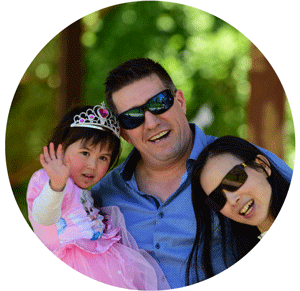
Annie Deng安妮·邓,澳洲顶级营销战略家, 高级翻译, 澳洲通, 中澳混血妈妈,移民澳大利亚十多年,现任澳洲投资房贷 Mortgage Corp市场总监。Annie采访来自各行各业的澳大利亚西人父母,从普普通通的清洁工,老师,工程师到赫赫有名的公司老总及澳洲政府官员, 通过精彩动人,富有感染力的澳洲育儿故事为中国和世界介绍展示澳洲淳朴的风土人情,丰富多彩的生活及澳洲经商之道。让广大华人客观全面了解澳大利亚教育,礼仪,生活,风光,商务及生意经。
Join Annie Deng, a top marketing strategist and storyteller as she brings your story to life to educate the Chinese people about Australia and raise your business profile within the Chinese community.
Thanks to Annie’s big network of highly influential people both here in Australia and in China, including influencers with millions of followers, your parenting story and business will get the opportunity to be exposed to millions of Chinese shoppers who are eager to open their wallet for quality Aussie products and services.
Book an interview with Annie today today and have your business promoted to millions of Chinese people without pushy sales techniques or faceless selling.
采访花絮:
香汰儿是一个超级乐观、热情、随和的妈妈,我跟她很有一见如故的感觉。整个采访过程中,我俩像认识多年的老朋友一样说说笑笑。跟我认识的很多澳洲人一样,香汰儿经历丰富,多才多艺,对于像我这种从小除了读书还是读书的人只有羡慕的份儿。听香涞儿说她是个歌手,我忍不住要求她高歌了几句:) 听一下,你觉得怎样?
跟我一样,香汰儿对孩子对教育有着极高的热情。我说我有个微信育儿群,有来自个地方的中国父母对教育有不同问题,香汰儿很慷慨地说有问题都可以发给她,她会一一回复,同时我们还讨论以后有机会邀请她到群里做客,和大家一起讨论有关育儿方面的话题,同时回答大家的问题。有没志愿做翻译的?请后台留言:)。如果看完下面的采访有疑问的话,请留言,我会尽快回复.
Chantal is such a positive, cheerful and fun person to chat to. I absolutely love her sense of humour, throughout the entire interview, we were talking and laughing like we were old friends. I wish I was half as talented as Chantal, her voice, wow! you’ll have to listen to her singing yourself!
Chantal has got so much love for kids and also so much to give to parents, I’ll try to organise for Chantal to come to my parenting WeChat group and answer questions. Feel free to send through your questions in the meantime.
Parenting Story Interview Transcript 访谈纪录
Annie Deng: Tell me a little bit about you, your family and your children!
来,做个自我介绍,说说你、你的家庭和孩子吧!
Chantal Harrison: I’m a parenting coach and child mentor, I have my own parenting blog Aunty Ask and I provide Free Parenting advice and tools to other parents to help them with kids’ behavioural, emotional and general wellbeing, I can do group and one-on-one coaching as well.
But I’m a Mum first and foremost, though I’m also a singer in a duo, writer, Zumba instructor and Bartender. I definitely have a very mixed bag of talents if you look at all my jobs!
I have two children: an 8-year-old girl and a 5-year-old boy. My eldest is definitely a strong-willed child which is wonderful and also hard work, my youngest has his moments but is a lot more like his Dad with his calm temperament
我是一个育儿规划师、儿童导师,我的育儿博客Aunty Ask给家长们提供免费西方育儿资源包括育儿理论,实践经验建议和方式方法,帮助他们与孩子的行为,情绪和身心各方面健康。我同时做群体辅导和一对一辅导。
我是二重奏歌手,作家,尊巴舞导师和酒保,但我的首要角色是个母亲。 看到这么多头衔,你就知道我肯定是个多才多艺的人(大笑)!
我有两个孩子:女儿8岁,儿子5岁。 我家老大意志坚定,很倔,好是好,就是比较难管。我儿子也有皮的时候,但性格更像他爸爸,冷静沉着。
Annie Deng: What made you want to become a coach and child mentor?
怎么想着要做育儿规划师、儿童导师呢?
Chantal Harrison: I’ve wanted to be a mum for as long as I can remember. I’ve always loved children, and I’ve always had such a connection with children. I loved that and I feel very deeply about children and children’s struggles. I still get tears in my eyes when I pass on good feedback about someone’s child. I’m very passionate about young people and advocating for them. It’s on that level that I want to be able to do more for them. If we all take on this type of parenting, it’s better for children everywhere. Robin Grille is a good parenting coach and psychologist here in Australia. He’s written a book called Parenting for a Peaceful World. The fact that if we parent these children right, in the future, we’re going to see much better ecosystems, environmental changes, political environments… it could be much better if we started by building up this generation.
打记事起,我就想成为一个母亲。我一直都特别喜欢孩子,跟孩子们有着特别的感情。我对孩子们所经历的种种困境感同身受。每当我给孩子家长好反馈建议时,仍然会热泪盈眶。我喜欢年轻人,喜欢支持宣扬他们的想法和梦想。我希望能够为他们做更多的事情。如果我们都可以这样教育孩子,世界各地的孩子都会受益。Robin Grille是澳大利亚一位非常棒的育儿辅导师和心理学家。他写了一本书,叫《善养小童成大同》(Parenting for a Peaceful World)。如果孩子教育好了,生态系统将会变好,环境和政治环境也会改善……我们最好现在就开始为下一代打好基础。
I’ve got two children of my own and have researched a lot of parenting related stuff. I’ve been so inspired by Aha Parenting, Hand In Hand Parenting, Playful Parenting and Robin Grille Parenting for a peaceful world, I’ve invested myself in parenting books and courses and become a certified parenting instructor and child mentor. The tools and advice work so well on my children, so I’ve been answering parenting questions using the knowledge I had gathered and provide answers in parenting blog Aunty Ask. The tools have worked for a lot of parents, as a matter of fact, I think they can benefit pretty much everyone. I just love to help and support parents as I want to be able to help families face-to-face as well as online. I, myself, continue learning and I love the idea that we are forging a better path with this generation!
我有两个孩子,为了他们,我研究了很多育儿领域的知识。我深受灵感教育 (Aha Parenting)、手牵手教育(Hand In Hand Parenting)、玩中学教育(Playful Parenting) 和Robin Grille的《善养小童成大同》这些教育理念的启发。我购买各种育儿书籍,参加相关课程,并且成为了一名合格的育儿规划师和儿童导师。这些教材以及方法对我自己的孩子非常行之有效,于是我开设了博客Aunty Ask, 在上面用我学到的知识为大家解答育儿方面的种种问题。这些方法对很多父母都起了作用,事实上,我认为对我们每个人都会有好处的。我喜欢帮助和支持父母朋友们,希望能在网络上和现实中面对面地帮助到每一个家庭。我自己仍在不断学习探索,为我们的下一代创造一条更好的道路。
Also, I’m in the trenches myself. I’m not just this person on pillar telling people you can be as perfect as I am whilst they feel like they can’t because they don’t feel like enough. I share all of it, including the times when I don’t feel like enough and what you or I can do. This is real life advice and it works!
其实,我自己经历了很多,我不是那个站着说话不腰疼,空喊 “你们可以像我一样完美”而事实上很多父母觉得自己不完美,做得不够好。我和他们分享一切,包括我自己束手无措的状况下,该怎么去处理问题。这些都是来自真实的生活建议,而且行之有效的!
Annie Deng: I’ve done a few parenting courses including Positive Disciplines and Positive Parenting Solutions they all encourage parents to work on themselves, change their expectations and attitudes and If the parents are happy and confident, the kids are more likely to be happy and confident. What’s the main message of what you teach?
我也学了几个育儿课程比如正面管教 (Positive Disciplines),正面育儿解决方案( Positive Parenting Solutions) 等都提到不是育儿而是教育家长,改变家长的期望值和态度,如果家长快乐自信,那么孩子也一般比较快乐自信。你的教学中主要的理念是什么?
Chantal Harrison: We do ‘Special Time’ which is connecting one-on-one with your child, as much eye-gazing as possible for a set time. That gives both you and the child a really special time which is different from your normal handing out time playing etc. Special time is one of our biggest connection tools. Eg: when you need to settle limits, you come in with eye contact and explain to the child eg: If you say you can’t play with that because it’s dangerous or for whatever reason, it’s about listening to children’s emotions. If they start crying or having a tantrum, again eye contact, get down to their level, and stay warm, then listen and they’ll get out what they need get out, could be what just happened or something happened last week, last month or at birth. whatever they need to offload. It’s about listening to emotions. Play listening is using play as it comes organically. It’s full of laughter, sometimes eg: you need to get out of the door, and you need them to get their shoes on. You go the playschool approach, who’s the fastest to get the shoes on. The last tool, which is the most important, which is a parent tool: listening time. Every week, I have a listening partner for 20 minutes or half an hour. You exchange time where you say all the things that have been haunting you that week. You offload it to someone who’s just “just listening”. No advice, not judging, they’re just holding the idea that you’re a good parent and you’ll work it out. That’s the most powerful tool, you have somewhere where you can offload whatever you need without judgement, knowing it’s safe. That’s my emergency tool.
我们有“特别亲子时间”,与孩子一对一互动, 尽可能多跟孩子正面眼神接触。这个特别亲子时间跟一般的陪孩子玩是不一样的。“特别亲子时间”是建立感情最好的一个沟通工具之一。比如,当你要定规矩时,蹲下来,看着孩子的眼睛跟他/她解释比如,你不能玩那个东西,因为太危险了或者其他什么原因, 然后就静静地聆听孩子的感受。如果孩子开始哭起来或者发脾气,同样地关爱地看着孩子的眼睛,然后静静聆听,孩子需要发泄,发泄对你的规矩的不满或者上周更或者出生是遇到的不顺心的事。不管孩子需要需要卸载什么样的情感,平静地聆听孩子的情绪。
另外一个就是边玩边聆听。在玩耍之中自然而然的去倾听他们的情感。这个过程应当是充满欢笑的。比如有时候你可能需要赶快出门,要孩子们快快地把鞋穿上,就可以采用边玩边学的方式:比赛开始了,看谁先把鞋穿好!
最后一个学习工具是聆听时间。每周,我和我的聆听伙伴会有20到30分钟的“倾诉时间”。我们轮流说说这个星期里发生的困扰我们的事儿。你把一切说出来,听伴只需要听,不提供任何建议或者评判。听伴持的观点是你是一个好父母,你会自己想办法解决这些问题。这是个最有效的工具,是我紧急武器,我知道我有一个安全的情绪发泄的地方,没有人会评判我。
Annie Deng: I started the parenting course when my daughter was 18 months and I’ve since seen big changes in me and her. Many people said that’s too early but it’s never too early is it?
在我女儿18个月的时候,我开始上育儿课程,从那时起,我和她都有了很大的改变,好的改变。很多人说18个月太早了,学习从来不会太早,对吗?
Chantal Harrison: No, it’s never too early. The earlier you start, the better, I think. The hand in hand parenting talking about from birth. If babies are being listened to from birth, it becomes so much more natural for them to offload their emotions. They’ll do it quicker, less often, they’ll pick and choose. They’ll become more emotionally intelligent, feeling their emotions, they’re in tune with when they can and when they can’t -unfortunately, in our society there are times when you can’t just offload your emotions. They have that emotional intelligence. So the sooner the better. This even applies to our relationships. This is just basic relationship skills and remember, our little people need us and our patience.
对, 多早开始都不算早。我认为其实越早开始越好。如果婴儿从出生开始就被倾听,那么让他们卸载情感就变得更加自然而然了。他们会做得更快,甚至变的不经常需要卸载情感,他们会自主做出选择。他们的情商会变高,感受到自己的各种情绪,他们会变的与他人更加合拍,当然现实社会里,有时候你不能随便发泄情绪。但这正是展示孩子高情商的时候。所有越早越好。其实这是我们处理关系中的一个必备技能对处理各种关系都有用。同时记着孩子需要我们,需要我们的耐心。
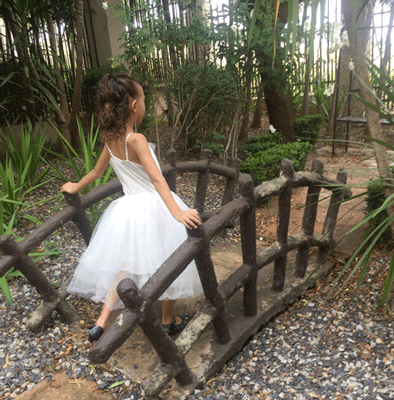
Annie Deng: What’s your parenting style?
你自己用什么样的育儿方式?
Chantal Harrison: I’m working through my daughter being exactly like me and why that triggers me so much! I call my parenting umbrella Empathic Child Rearing with my favourite resources being Hand In Hand Parenting, Playful Parenting and Aha Parenting.
我把我的育儿框架称为“感同身受育儿法”,我最喜欢的资源是“手牵手育儿法”、“玩中学教育”和“灵感育儿法”。我女儿非常像我,常常让我很恼火。我正在学着处理这点!
Annie Deng: What’s your greatest challenge in raising your children?
育儿过程中最大的挑战是什么?
Chantal Harrison: My own triggers and lack of patience. Loads of times when I can’t just dig deep and be playful or when I’m standing on the street yelling “HURRY UP! We are LATE!” instead of getting up there and working out what needs to be done. And that’s a vicious cycle. Now that I’m a kids coach and I understand why kids need empathy and connection, when they don’t get it or when they don’t get to express their feelings, it gets stored in what we call an “emotional backpack” and a heavy emotional backpack is the source of all off-track behaviour. So you empty it with connection and supported release of emotions but then you fill it back up when you’re lacking in patience or lose your temper, etc.
I believe the best response is to Stop, Drop and Breathe which I learned from Dr Laura Markham but you gotta make sure that backpack is not too heavy and that cup is not too low for you to be able to do this!
我自己的情绪和缺乏耐心。很多时候,我不能开心愉快的同他们深入探讨某个问题。我自己不够放松也不追根溯源,或者站在街上大喊“快点,我们迟到了!”,而不是找出解决问题的方法。就变成了恶性循环。现在作为一名儿童导师,我理解了为什么孩子需要同情和关爱。当他们得不到或者没办法表达自己情感的时候,这些情绪就会装进他们的“情感包袱”里。沉甸甸的“情感包袱”是所有不好行为的根源。当你关爱孩子与他们, 帮助他们释放情绪,你是在为孩子清空情感包袱,而当你你失去耐心,发脾气时候,你是在孩子的“情感包袱”里塞东西,让其变得更沉重。
我从Laura Markham 博士学到的在遇到挑战时最好的反应就是停下,放开正在做的事,深呼吸。但要确保情感包袱”不是太沉同时情感杯够满。
Annie Deng: How do you do it, examples please?
具体怎么执行呢?可以举个例子吗?
Chantal Harrison: Special Time and roughhousing are among the best connection tools so I try to do them daily, even if it’s only 10 minutes of Special Time and 3 mins rough as we have been doing lately and then most important is getting Listening Time for me so I can empty my own backpack with the supportive warmth of a non-judgemental listener. I get at least 30 minutes Listening Time a week and the idea is we exchange this time in which we can offload whatever we need to and the Listener listens without interruption and just affirms that you are good and wise and have all the answers.
“特别时间”和“打闹玩耍”是和孩子们建立感情的最好工具之一。我每天都会用,即便只是10分钟“特别时间”和3分钟的“打闹玩耍”。
再有,我自己的“倾诉时间”也非常重要。这个过程让我能够有机会释放自己的“情感包袱”,面对一个不会评价你的贴心听众。我每周至少有30分钟“倾听时间”。你和你的听伴彼此说出这个星期里发生的困扰你的所有事情。听伴不会打断你,只会强调说你够聪明,相信你会想出解决办法来的。
Annie Deng: Share a story when you felt like you were not a good parent.
有没有什么时候觉得自己做妈妈做的不够好
Chantal Harrison: Constantly!! It certainly doesn’t help them and that’s one of the many things I am working on. Shame and guilt are the only emotions that don’t really serve us.
常常会! 当然,这种想法对孩子们没有任何好处,这也是我正在努力改变的事情之一。愧疚感和自责感是唯一不能帮助我们的情绪。
Annie Deng: What’s your biggest parenting mistake so far?
育儿中最后悔的错误是什么?
Chantal Harrison: Sticker charts! When I had my first child and I was still in that airy-fairy, loved-up phase and I never even thought to teach her how to clean up after herself and pick up her toys and stuff, like most other parents, I used the sticker charts to motivate her, it was such a brief period in which we did that but it totally eradicated my daughter’s intrinsic motivation and set up a power struggle dynamic! Whereas my son, from a very very young age, we’d go and pick up the toys when we finished, and then sing a song. It was fun. no stickers, no rewards because babies are born with that instinct, when kids are little, they want to help us and please us.
奖励贴纸表!当我第一个孩子出生后,我还处在那种不切实际的,母爱满满的阶段。我从来没有想过要教女儿如何清理,收拾自己玩具之类的事儿。和大部分父母一样,我用奖励贴纸表来激励她。其实这个方法仅仅只持续使用了很短暂的一段时间,但后果却是它彻底消除了我女儿天生的动力,取而代之的是“战斗”的升级!而我的儿子,从很小开始,玩完玩具之后我们会一起把玩具收拾好,然后坐下来一起唱首歌来庆祝。整个过程很好玩,既没有贴纸,也没有奖励。因为婴儿生来就有这种本能,在很小的时候,他们就想通过帮助大人做些事情而取悦我们。
Sticker charts and other rewards teach children to work for the “prize” and also teach them to be motivated by what someone else wants, as in extrinsic motivation and studies show a lot of kids work just hard enough for that prize and there’s also a lot of emotional turmoil in the hoping/expectation for the prize that distracts from the initial enjoyment of learning. For us, I feel that experience made us think that to do anything there had to be something in it, some external motivation whereas you can establish child contribution very early on by making it part of daily life and part of being a contributing member of a family.
奖励贴纸和其他奖励方法教孩子为了获得奖励而行动同时教孩子为了满足他人的需求而行动,也就是所谓的外在动机。研究表明,很多孩子纯粹为得到奖品而努力,一旦奖品到手就不再用心,同时孩子在期望获得奖品的过程中经历很多感情上的起起伏伏,从而失去了他们本来可以从学习中获得的乐趣。对我们来说,经历告诉我们,做任何事情一定要有对我们有利的东西。相反,我们其实可以在孩子很小的时候,在日常生活中让孩子养成对家庭做贡献的习惯。
It’s frustrating when you’re doing the dishes and they want to do something messy. But if you let them join you and it’s part of something they want to do and it continues that way, you don’t have to tell them you now want them to start helping out with dishes and it seems like a chore. It’s about following those cues and making it a part of daily family life. That once you’ve finished dinner, you take your plates to the kitchen and put them in the dishwasher, or whatever. Alfie Kohn is sort of the expert on rewards and punishment. He has a book called Punished By Rewards. That intrinsic versus extrinsic motivation. They are born wanting to do those things. Using a dangling carrot method, they start looking for that, and when you remove that, they question why they should do what you ask them. You have to work hard to get it back again.
当你在餐后收拾碗碟的时候,孩子们开始捣乱,这确实让人沮丧。但是,如果你让他们和你一起收拾,他们也想帮忙,慢慢地就成习惯了。不用等他们大一些的时候跟他们说希望他们帮忙收拾碗碟,那感觉就是件差事。通过一些小事,把家务纳入生活习惯中。比如,吃完饭后,直接把盘子拿到厨房,放到洗碗机里。Alfie Kohn是奖惩方面的专家。他有一本书叫做《用奖赏惩罚》,讲的是有关内在动力与外在动力。孩子们天生就喜欢帮忙做事事。你如果用一种“悬挂的胡萝卜”方法,他们就会为了得到奖励而努力。当奖励没有了的时候,他们就会想为什么要按照你要求的做。这时就要花很大的劲才能重新让孩子找到做家务的内在动力。
But also remember, like us, kids may have good days and bad days as well. All their daily stresses and anxieties that go into their emotional backpacks. When things don’t work as what you expect even though you think you might have done all the right thing, it could be a question of how connected they feel at that point. Connection is what makes them choose between what we want them to do and what they want to do. That’s why it’s all about setting that connection as a preventative measure.
同时,和我们成人一样,孩子们也有心情好坏的时候, 日常的压力和焦虑都会装进他们的“情感包袱”当中。当你做了一切能做的事还是没有效的话,可能要看看孩子当时心情怎样。感情的深浅是让他们在“我们想要他们做什么”和“他们自己想要做什么”之间做出选择。这就是建立好跟孩子之间的情感联系是关键的原因。
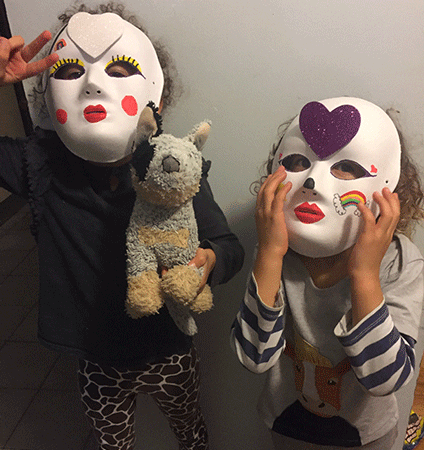
Annie Deng: What is your proudest, happiest or funniest parenting moment so far?
你作为家长最自豪的时刻是什么?
Chantal Harrison: Just who they are. They make me proud every day!
我爱他们,我每天都为他们感到自豪。
Annie Deng: What do you normally do with your kids?
你经常和孩子在一起做什么事情呢?
Chantal Harrison: We usually go out and about. Today is one when we have swimming. We spend the day at the park or with a friend. We generally don’t stay at home unless the weather’s awful. I do the daily special time with them both after school at home.
我们通常出去玩。比如,今天是游泳课。我们一般会去公园或者拜访朋友。除非天气非常不好,否则我们一般不呆在家里。每天放学后回家,我们专门的“特别时间”。
Annie Deng: What do you do during the special time?
“特别时间”有什么内容呢?
Chantal Harrison: Special time is whatever they want to do. For my daughter, it’s the same thing every time: barbies. With my son, it can be whatever. He’s a bit more exploratory. He will come up with whatever he can come up with in the moment.
“特别时间”就是做任何他们想做的事情。我女儿每次都是同一件事情:芭比娃娃。我儿子更具探索性,任何事情都是有可能的。他会即兴想出要做的事。
Annie Deng: How long do you have that special time for?
“特别时间”通常多长
Chantal Harrison: Usually, we do ten minutes of special time and I tag on three minutes roughhousing onto that.
通常我们做十分钟“特别时间”,紧接着会有三分钟打闹时间。
Annie Deng: Is it important to emphasize that this is special time?
有没有必要跟孩子们强调现在是“特别时间”?
Chantal Harrison: Yes. That’s what transforms it. They know that during special time, there’s no phones, no backgrounds, no electronics. They know that it’s intensive one-on-one time, it’s all about them. That’s why it does help to time it. Some people say they do that for hours a day, but they’re not actually getting the benefit of that. I would love to do more than 10 minutes, but we’re just finding it so hard. Instead of saying I don’t have time to do it today, I should just do a bare minimum. I saw the differences once I stuck to it. It really helps to give it that extra. It’s the best of my mum’s attention and connection, this is my time.
有必要,那是关键。他们知道在“特别时间”里,没有电话,也没有背景音乐或者任何电子设备。他们知道这是特别的一对一的相处,是以他们为主的时间。这就是为什么要特别说明是“特别时间” 的原因。有的人说他们整天都在和自己的孩子进行“特别时间”,却没有受益。我也很希望跟孩子的“特别时间”可以更长一些,但很难。我宁可尽一切可能保证每天有“特别时间”,而不是跟孩子们说“很遗憾今天妈妈太忙了,没办法和你一起度过‘特别时间’。”在坚持一段时间以后,我就看到了成效。同时对孩子来讲,知道每天妈妈会花“特别时间”全身心地陪我玩时间,这对于培养和孩子的感情是有很大帮助的。
Annie Deng: What do you find when you finish and they want another ten minutes?
如果时间到了,然而孩子们还想要额外十分钟时你该怎么办呢?
Chantal Harrison: You can decide. If you’re happy to do that. On some occasions, I’ll do that. If there’s some big feelings around spending more time, maybe they also need to come out. You can say that you’ve done that special amount of time, and then just wait for the feelings to overflow. Or they can say that it’s just because they don’t have anything else to do right now. You want to try and keep it so that they know. It transforms them into a different state.
你自己决定,你如果愿意,也可以再多陪他们一会儿。有时候我会这样做的。特别是如果孩子强烈想要我多陪他们一些时间,他们或许需要发泄一下,你可以说妈妈已经陪你度过了今天的“特别时间”,然后等着看孩子是否要宣泄感情。或者他们这么说只是因为他们没有别的可做的事。要尽量保持“特别时间”就是“特别时间”,这样他们知道和其他时间的区别。
Annie Deng: What’s your bedtime routine?
孩子们睡前作息怎么安排的?
Chantal Harrison: I read a story to my daughter. After that, I go and do my son’s bedtime and my husband goes to my daughter and they have a whole ridiculous routine. When she was younger, our siblings lived above us so everybody came to her bedroom and read her a story, we’d sing her a song, do a prayer, it was a big song and dance. Then we had a second child and that had to change a bit. I think she still does a song with him and she does a little meditation before she goes to bed. My son, I read the story with him, we do a song and we turn out the light. He has a Dinosnores CD that I put on and it puts him to sleep pretty quickly. I’ll sit next to him by the bed.
我给女儿读一个睡前故事。之后,我去安顿儿子睡觉。我丈夫去女儿卧室,他们俩有个特别搞笑的睡前仪式。在我女儿小时候,我的兄弟姐妹住在我们楼上,每个人都去她卧室里,给她读故事,我们给她首歌,做祈祷,一段很长的歌舞。然后我们有第二个孩子以后,这个习惯不得不进行改变了。现在,女儿还会和爸爸一起唱首歌,然后做睡前冥想。我坐在床边,给儿子读故事,一起唱首歌,然后关灯。他听着恐龙打鼾(Dinosnores) 故事歌碟很快地进入梦乡。
Annie Deng: Who did you say did meditation?
你刚才提到谁做冥想?
Chantal Harrison: There’s a company called Dinosnores, and they write these stories which are meditational kids’ stories. We put that on as he goes to bed, there’s a dragon one, mermaid one, fairy one… It has a little story which has lots of things built in about closing your eyes, we had a bit day, time to go to sleep… The second track is just white noise which lets him sleep quite well.
有一家叫做恐龙打鼾(Dinosnores)的公司,给孩子们写了很多有声冥想故事。在我儿子上床睡觉前,我们把CD打开放在床上,有龙的故事,美人鱼的故事,还有仙女的故事……一个个短小的故事,包括“闭上眼睛,今天玩了一天了, 现在该睡觉了。。。。。。”等等。故事结束后就是背景音乐,可以帮助孩子睡得很好。
Annie Deng: So they go to bed, what do you do?
孩子睡觉后你干嘛呢?
Chantal Harrison: It’s our time! We usually watch a show together. We’re currently watching Smallville.
接下来就是我们自己的时间了!我们通常会一起看个电视剧,现在我们正在看《超人前传》Smallville。
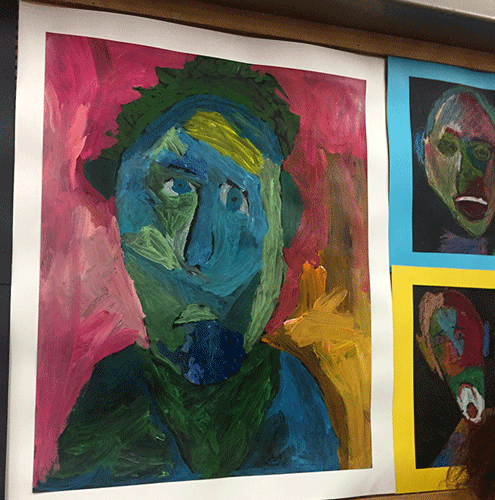
Annie Deng: What do you enjoy most with your children?
你最享受和孩子们做什么?
Chantal Harrison: Roughhousing. Roughhousing is a really great tool to get stuff out. Even the most peaceful kids benefit from doing some rough and tumble play. Usually, it brings a lot of laughs. For parents, it’s usually about playing the bumbling fool. You’re always going to be the weaker one. It gets heaps of laughs and they loosen up. My older one doesn’t offload her emotions very well, so it’s good to get the laughter out of her. She really loosens up after some rough play. She’s very rigid in what she’ll do, but we crack through that and get some good, rough routine going. It’s quite transformative. Happy hormones for everyone. Lots of cultures show that the dads do the rough and tumble play, but there’s some really amazing hormones that are released during that and bond people together. It’s really worth the mums getting in on that action as well.
打闹玩耍。打闹真的是一个特别棒的释放自我的办法。即便是最安静的孩子也能从打闹中获益非凡。通常,打闹会给我们带来很多欢笑。父母们通常扮演笨手笨脚的傻瓜,弱者的角色。大家在一起放声大笑并得到放松。我女儿不太擅长释放自己的感情,她比较严肃,所以能让她开心的笑出来是一件非常好的事。她在一阵打闹过后会变的非常轻松。她对自己要求严格,但我们还是设法通过一系列的打闹活动解决了这一问题。在快乐荷尔蒙影响下,每个人都开开心心,,很神奇。在很多文化里,爸爸和孩子们一般喜欢打闹戏耍,释放不可思议的荷尔蒙,让人更亲密。其实,妈妈们也应该参与到和孩子打打闹闹中来, 很有益的。
Annie Deng: my husband does that, too. Laughter is the best medicine, isn’t it?
我丈夫也经常和孩子玩打闹的游戏。欢笑真的是最好的良药。
Chantal Harrison: There’s loads of things you can do. Pillow fighting is one of the best, play-wrestling, we do a game called sausage roll where we roll across the bed together. It’s really fun.
你可以做各种各样的事。扔枕头和玩摔跤游戏是其中特别好的方式。我们还玩一个叫滚香肠(sausage roll )的游戏,大家抱在一起从床的一边滚到另一边。真的特别好玩。
Annie Deng: What’s your children’s favourite dish?
孩子们最喜欢的一道菜?
Chantal Harrison: Yorkshire puddings! Not at all healthy!! 约克郡布丁!好吃但不健康!
Annie Deng: What’s your kids’ favourite book, toy and game?
孩子最喜欢的书,玩具,游戏?
Chantal Harrison:
Book – Who Are You? : The Kid’s Guide to Gender Identity
Toy – Lego
Game – Hungry Caterpillar
书:《你是谁?》《儿童性别认同指南》
玩具: 乐高
游戏: 好饿的毛毛虫
Annie Deng: What do you love most about being a parent?
你最享受妈妈这个角色中的哪一点?
Chantal Harrison: It’s a non-stop growth journey! 这是一段没有停歇的成长旅程。
Annie Deng: How are you sharing your parent role with your partner/spouse?
你和你丈夫如何分担父母的角色?
Chantal Harrison: We are a team. We both do what we can! 我们俩是一个团队。我们都尽力做到最好。
Annie Deng: Have you travelled anywhere with your children that you and your children just absolutely loved?
Chantal Harrison:南非。孩子们在原始的南非充分体验我妈妈故乡的风土人情。同时我们又身为游客,体验了南非的各种美。
Yes, South Africa. I love that my kids get a full immersion in my Mum’s culture in rural South Africa as well as experiencing all the touristy experience.
Annie Deng: 可以给带孩子旅行的家长们提供一些建议吗?What advice can you give to parents traveling with children?
Chantal Harrison: 想办法找到一些可以进行彼此倾诉的朋友。还有母乳喂养有时候可以解决燃眉之急。
Set up some Listening Time contacts whilst you’re over there and breastfeeding is a lifesaver if you can!
Annie Deng: 你如何保持工作以及个人生活之间的平衡?How do you keep a work life balance?
Chantal Harrison:我根据孩子的时间调整工作时间。
I centre most of my work around my child’s time.
Annie Deng: 你一般如何忙里偷闲放松自己?Self care- what do you do for yourself to recharge?
Chantal Harrison: 孩子们睡了以后,和我的丈夫放松的喝上一杯茶,看看节目。
Have a chai tea and my husband and I relax and watch a show once kids are in bed.
Annie Deng: 给其他家长特别是刚做了家长的朋友一些建议?Share a parenting resource, eg: website, course, book etc.
Chantal Harrison:手拉手育儿,玩耍育儿和灵感育儿法。
Hand In Hand Parenting, Playful Parenting and Aha Parenting.
Annie Deng: 你可以给其他父母一些建议吗?Share a few tips with other parents and especially new parents
Chantal Harrison:有时间的话,读读Patty Wipfler 和 Tosha Schore写的书《倾听》(Listen),和《手拉手育儿法》(Hand In Hand Parenting)。从孩子出生开始所需要了解的知识上面都涵盖了。放下你的各种期望,你明白自己遇到育儿的种种困难,没关系的!
Read Listen: Five Simple Tools to Meet Your Everyday Parenting Challenges familiarise yourself with Hand In Hand Parenting. It has everything you need from birth! Oh and let go of expectations and know that it IS hard and that’s ok!
我还发现很多文化不允许孩子释放自己的情感。现在,我不喜欢别人说“不要哭”。我想让他们哭,没关系的,他们有自己的感觉。我可以理解由于文化差异,父母的教育方式也会大相径庭。
I also find lots of cultures don’t allow children’s feelings. Nowadays, I don’t like it when people say, ‘don’t cry’. I want them to cry, it’s okay, they’re having their feelings. I understand it’s a cultural thing. And parenting can be very different.
- 不要期望过多,意识到育儿不容易,不过没关系!(Let go of expectations and know that it IS hard and that’s ok!)
- 让孩子哭,他们也是有感情的。(Let kids cry, they have feelings.)
Australian etiquettes 澳洲风俗礼仪
Annie Deng: 可以为海外游客,留学生,新移民一些关于澳洲的风俗礼仪上的建议吗?Can you offer some advice to overseas tourists, students, immigrants coming over to Australia to study, visit or immigrate regarding Australian etiquettes?
我唯一能想到的是,海外游客们没有得到父母允许,拿着相机就拍别人的孩子。我不喜欢别人给我的孩子拍照。
The only thing that comes to mind is that tourists don’t seem to think twice about taking photos of people’s children. I don’t like the idea of people taking a photo of my kids.
Business etiquettes 经商之道
Annie Deng: 海外商人到澳洲做生意应该注意哪些方面呢?What should overseas business people know about doing business in Australia?
建立关系,真诚的关系。这是企业必须的,也是使一个企业脱颖而出的要素。我们特别需求讲道德,保护环境的企业。如果你的企业不能做到非常环保,可以通过捐赠来抵消给环境带来的影响。
Chantal Harrison: Establish relationships, genuine ones. That’s what we are all looking for in business and that’s what makes one business stand out from another. There’s also a strong pull for ethical and environmentally friendly organisations so if you can’t be eco-friendly then donate to causes that offset that.
Chantal Harrison’s Contact Details


请留下您的宝贵意见和建议!
What do you think of the story? What stories would you like to hear and what other questions would you like to include, leave a message here or email us info@miamadeinaustralia.com
您喜欢这个故事吗?那些方面可以改进?您想听什么方面的育儿故事?请建议其他您关心但没有谈到的话题?点击留言或直接邮件info@miamadeinaustralia.com
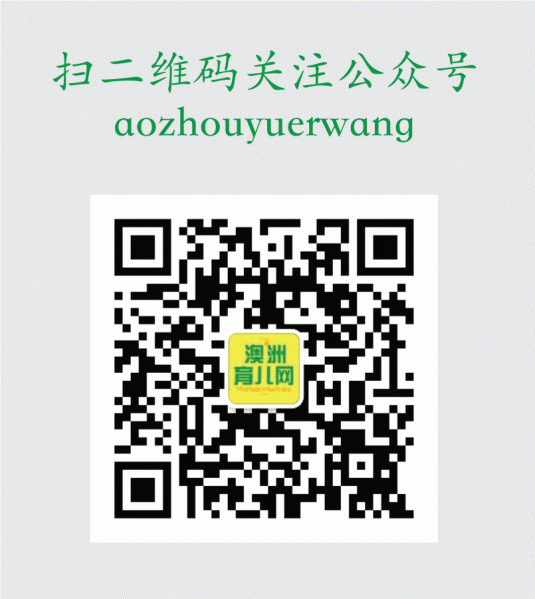
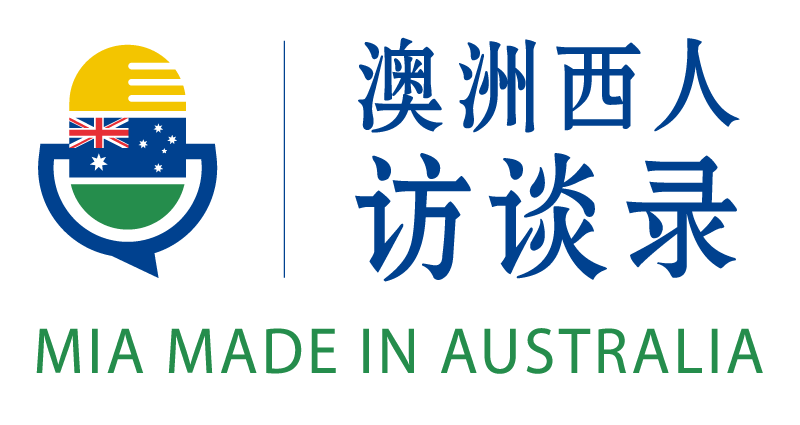

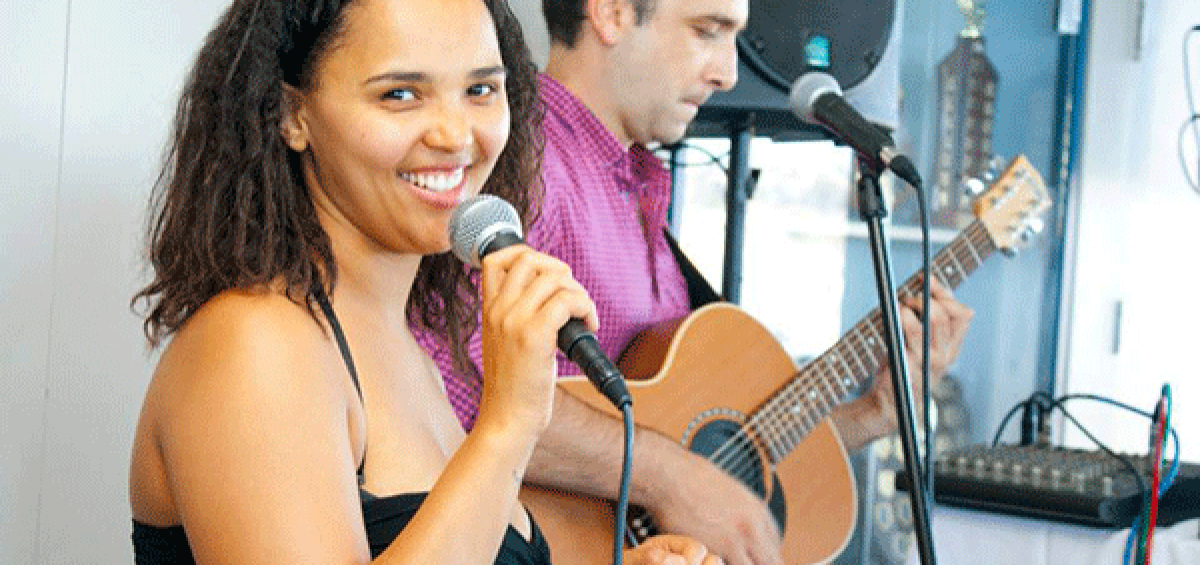
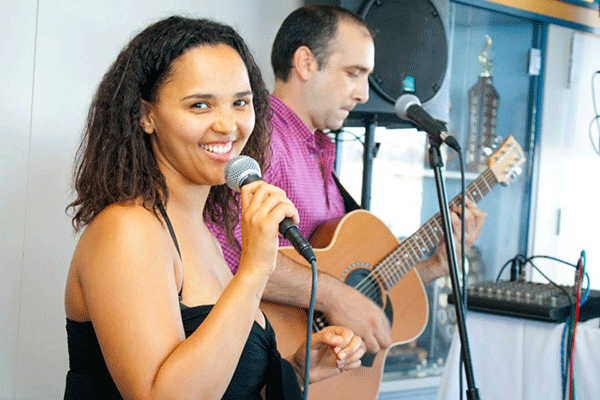

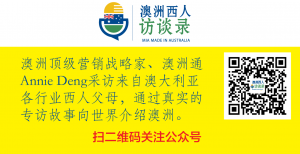
留言/评论